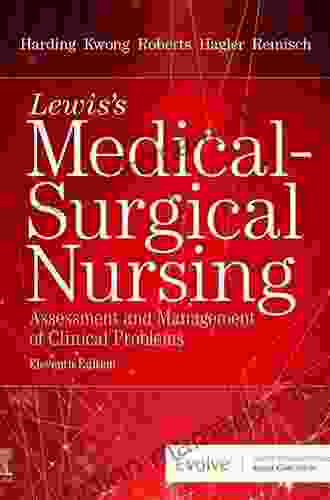Assessment and Management of Clinical Problems: A Comprehensive Guide for Healthcare Professionals

Assessment and management of clinical problems is a fundamental skill for healthcare professionals. It involves the systematic evaluation of a patient's presenting symptoms, the identification of underlying causes, and the development and implementation of appropriate treatment plans. This complex process requires a combination of knowledge, clinical judgment, and communication skills.
This article provides a comprehensive overview of the assessment and management of clinical problems. It covers the principles, methods, and techniques used by healthcare professionals to effectively diagnose and treat patients. By understanding the steps involved in this process, healthcare professionals can improve their diagnostic accuracy, optimize treatment outcomes, and provide the best possible care for their patients.
4.8 out of 5
| Language | : | English |
| File size | : | 568481 KB |
| Text-to-Speech | : | Enabled |
| Screen Reader | : | Supported |
| Enhanced typesetting | : | Enabled |
| Print length | : | 1699 pages |
Patient Assessment
The first step in managing a clinical problem is to conduct a thorough patient assessment. This involves gathering information about the patient's symptoms, medical history, and lifestyle factors.
Symptoms
Symptoms are the primary reason why patients seek medical attention. They can be described as subjective experiences that are reported by the patient.
When assessing symptoms, it is important to consider the following:
- Onset: When did the symptoms first appear?
- Duration: How long have the symptoms been present?
- Severity: How severe are the symptoms?
- Character: What is the nature of the symptoms?
- Location: Where are the symptoms located?
- Associated symptoms: Are there any other symptoms that are associated with the primary symptoms?
Medical History
The patient's medical history provides valuable information about their overall health status and any previous medical conditions that may be relevant to the current problem.
When taking a medical history, it is important to ask about the following:
- Past medical history: What medical conditions has the patient had in the past?
- Family history: Are there any family members with similar medical conditions?
- Social history: What is the patient's occupation, lifestyle, and social support system?
- Current medications: What medications is the patient currently taking?
- Allergies: Does the patient have any allergies to medications or other substances?
Lifestyle Factors
Lifestyle factors can also play a role in the development and severity of clinical problems. It is important to ask about the patient's:
- Diet: What foods does the patient eat on a regular basis?
- Exercise: How often does the patient exercise?
- Smoking: Does the patient smoke?
- Alcohol use: Does the patient drink alcohol?
- Drug use: Does the patient use any illicit drugs?
Differential Diagnosis
Once the patient assessment is complete, the next step is to develop a differential diagnosis. This is a list of possible diagnoses that could explain the patient's symptoms.
To develop a differential diagnosis, healthcare professionals consider the following:
- Symptoms: The patient's symptoms are the most important clue to the underlying cause of the problem.
- Medical history: The patient's medical history can provide additional insights into the possible diagnoses.
- Physical examination: A physical examination can help to confirm or rule out certain diagnoses.
- Laboratory tests: Laboratory tests can provide objective evidence to support or refute certain diagnoses.
- Imaging studies: Imaging studies can help to visualize the affected area and identify abnormalities.
Once a differential diagnosis has been developed, healthcare professionals can begin to narrow down the list of possible diagnoses by performing additional tests and procedures.
4.8 out of 5
| Language | : | English |
| File size | : | 568481 KB |
| Text-to-Speech | : | Enabled |
| Screen Reader | : | Supported |
| Enhanced typesetting | : | Enabled |
| Print length | : | 1699 pages |
Do you want to contribute by writing guest posts on this blog?
Please contact us and send us a resume of previous articles that you have written.
 Top Book
Top Book Novel
Novel Fiction
Fiction Nonfiction
Nonfiction Literature
Literature Paperback
Paperback Hardcover
Hardcover E-book
E-book Audiobook
Audiobook Bestseller
Bestseller Classic
Classic Mystery
Mystery Thriller
Thriller Romance
Romance Fantasy
Fantasy Science Fiction
Science Fiction Biography
Biography Memoir
Memoir Autobiography
Autobiography Poetry
Poetry Drama
Drama Historical Fiction
Historical Fiction Self-help
Self-help Young Adult
Young Adult Childrens Books
Childrens Books Graphic Novel
Graphic Novel Anthology
Anthology Series
Series Encyclopedia
Encyclopedia Reference
Reference Guidebook
Guidebook Textbook
Textbook Workbook
Workbook Journal
Journal Diary
Diary Manuscript
Manuscript Folio
Folio Pulp Fiction
Pulp Fiction Short Stories
Short Stories Fairy Tales
Fairy Tales Fables
Fables Mythology
Mythology Philosophy
Philosophy Religion
Religion Spirituality
Spirituality Essays
Essays Critique
Critique Commentary
Commentary Glossary
Glossary Bibliography
Bibliography Index
Index Table of Contents
Table of Contents Preface
Preface Introduction
Introduction Foreword
Foreword Afterword
Afterword Appendices
Appendices Annotations
Annotations Footnotes
Footnotes Epilogue
Epilogue Prologue
Prologue Trevor Pacelli
Trevor Pacelli Stephanie Sloane
Stephanie Sloane Jennifer Mcilwee Myers
Jennifer Mcilwee Myers A K Scott
A K Scott Angie Hockman
Angie Hockman Kris T Bethke
Kris T Bethke Jennifer Joy
Jennifer Joy Holly Bridges
Holly Bridges Kolbie Blume
Kolbie Blume Jennifer Yousif
Jennifer Yousif Benjamin Spock
Benjamin Spock Maria Ganci
Maria Ganci Jeanette Nyberg
Jeanette Nyberg Anne Ro
Anne Ro Donald A Schon
Donald A Schon Beata Borucka
Beata Borucka Kevin Kryptor
Kevin Kryptor Donald Crane
Donald Crane Kate Hewitt
Kate Hewitt Mother Bee Designs
Mother Bee Designs
Light bulbAdvertise smarter! Our strategic ad space ensures maximum exposure. Reserve your spot today!
 Ernest PowellFollow ·11k
Ernest PowellFollow ·11k Chinua AchebeFollow ·18.7k
Chinua AchebeFollow ·18.7k Elias MitchellFollow ·5.9k
Elias MitchellFollow ·5.9k E.M. ForsterFollow ·9.2k
E.M. ForsterFollow ·9.2k Ernest J. GainesFollow ·2.1k
Ernest J. GainesFollow ·2.1k Sean TurnerFollow ·3.8k
Sean TurnerFollow ·3.8k Doug PriceFollow ·18k
Doug PriceFollow ·18k Eric HayesFollow ·15.7k
Eric HayesFollow ·15.7k

 Ashton Reed
Ashton ReedClean(ish) Food for People Who Like to Eat Dirty
By: [Your Name] Are...

 Ronald Simmons
Ronald SimmonsThe Handbook for Educators: A Comprehensive Guide to...
The Handbook for...

 Derrick Hughes
Derrick HughesAny Place Hang My Hat: A Hauntingly Beautiful Novel by...
A Masterpiece of...

 Adrien Blair
Adrien BlairFly Me to the Moon Vol. 5: A Lunar Odyssey through...
In the vast...

 William Powell
William PowellTips By Gardeners On Variety Of Subjects
Gardening...
4.8 out of 5
| Language | : | English |
| File size | : | 568481 KB |
| Text-to-Speech | : | Enabled |
| Screen Reader | : | Supported |
| Enhanced typesetting | : | Enabled |
| Print length | : | 1699 pages |














